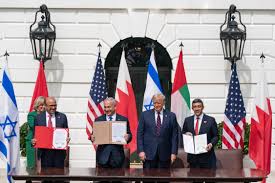Understanding the Significance of the Abraham Accords

Introduction
The Abraham Accords, signed in September 2020, represent a historic milestone in the pursuit of peace in the Middle East. In an era plagued by longstanding animosities, these agreements between Israel, the United Arab Emirates (UAE), and Bahrain highlight a significant shift towards diplomatic recognition and cooperation. The importance of the Abraham Accords lies in their potential to transform relationships not only between Israel and its new Arab partners but also across the entire region.
The Agreements and Their Impact
Initially brokered during the Trump administration, the accords facilitated the establishment of formal diplomatic ties between Israel and the UAE, followed by Bahrain. This was groundbreaking as it marked the first time in over 25 years that an Arab country officially recognised Israel, paving the way for direct flights, trade agreements, and various collaborations in sectors such as technology, health, and tourism.
Since the signing, other nations, including Morocco and Sudan, have also joined the accord, further expanding the diplomatic landscape. The agreements aim to promote stability and economic growth, with a significant emphasis placed on collaborative efforts to advance security partnerships against shared concerns, namely regional threats posed by Iran and extremist organisations.
Challenges and Criticism
Despite the optimism surrounding the Abraham Accords, challenges remain. Critics argue that the agreements do not adequately address the ongoing Israeli-Palestinian conflict, with many Palestinians feeling sidelined. Furthermore, some nations remain hesitant to follow suit, raising concerns about the long-term viability and impact of these accords on the broader peace process.
Conclusion and Future Prospects
As we look to the future, the significance of the Abraham Accords will largely depend on the ability of signatory nations to leverage their new relationships to foster greater regional cooperation and dialogue. Observers note that while these agreements symbolize a step forward, lasting peace in the Middle East will require continued efforts to engage with the Palestinian issue and address the complex socio-political dynamics at play.
In conclusion, the Abraham Accords represent a landmark development in Middle Eastern diplomacy, with the potential to reshape the region’s geopolitical landscape positively. As nations build upon this momentum, the world watches with interest to see if this will result in a more peaceful and cooperative Middle East.









